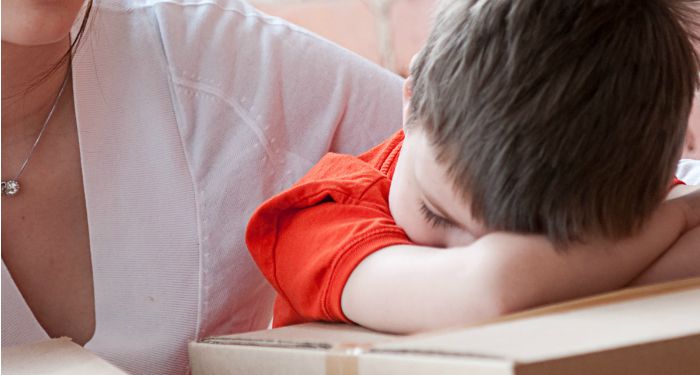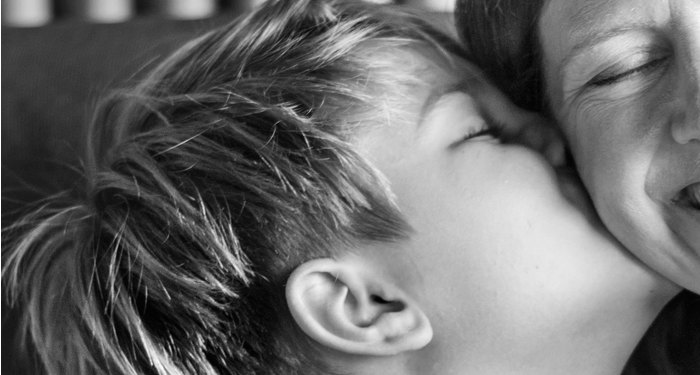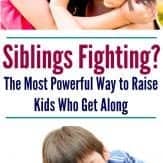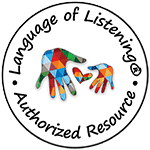Inside: Are your kids more like jealous siblings than friends forever? Learn this powerful 3-part approach to help you respond to your kids’ sibling rivalry and fighting.
My heart leapt into my throat the moment I heard those words escape my son’s mouth and enter into the space between us.
“I don’t like her. I never wanted a sister.”
There was a huge part of me that knew it simply wasn’t true, but it still hurt. More than anything, I wanted all of us to love each other. To get along. To be a happy family.
My stomach twisted in knots as I paused to think for a minute. Of course he loves his sister. How could he not? I can’t believe he would say he never wanted her.

Then it dawned on me.
Flashes of the past days, weeks and months appeared before my eyes.
She would take a toy of his, he would rip it back, and I would remind him to share. He would snuggle up on my lap, she would cry, and I would get up because I felt split. She would knock over his block tower, he would scream at her, she would cry, and I would tell him to stop doing that.
Everything that was once his—and his alone—was now shared with another person. Heck from his perspective, it probably seemed like his sister stole me away from him. It’s no wonder he didn’t like her.
Was this about sibling jealousy?
No matter the reason siblings say they “don’t like each other” there is always something deeper beneath those words. In the simplest terms, siblings not liking each other often boils down to two things: having to share their world with a sibling…and favoritism.
Kids are absolutely positively sure that everything that was once theirs is now ruined by their sibling. They may also believe that you love and favor their sibling more than them. This is very real for kids.
And that’s not even the worst part.
What’s worse is when you try to tell a child, “Of course you love your sister,” or “It’s not okay to say you don’t like someone,” or “You don’t hate your brother. I know that’s not true,” the disconnect widens.
Kids will dig their heels in even more and try to prove you wrong. They’ll try to prove to you that their feelings are very real. That they really, really, really never wanted a sister. Or that you really, really, really do love their sibling more than them.

How to help siblings get along.
There is a deep sadness inside kids when they say things like, “I never wanted a sibling.” Or “I hate my brother or sister.” Or “You love her more than me! She always gets her way.” You can jump straight into the heart of the issue using Language of Listening®.
1. SAY WHAT YOU SEE®.
You can describe what is happening in the moment by saying (describing, etc.) what your child is doing, saying, thinking and feeling without questions, fixing or judgement. This is the neutral zone where you and your child can agree on what is happening in the here and now.
You don’t have to agree with what your child feels and thinks; you are simply agreeing that these are—in fact—things your child is thinking and feeling in a particular moment.
“Sounds like you wish it was just you and me. You don’t like your sister around. It seems like you have to share everything with her—even me! No wonder you don’t like her right now!”
“Sounds like you think I love her more than you. Especially when she tore down your tower and then I told you to stop yelling at her. It just doesn’t seem fair! To you it seems like I’m always doing more for her than you, and you feel really sad about that.”
Related: One Surefire Way to Stop Entitlement and Raise Kind Kids
2. Offer a CAN DO.
In the case of sharing, there are infinite solutions to help kids know that while they do have to share, there are special things they can keep only for them.
“Hmmm…you want to play with this toy and your sister keeps knocking it over. There must be something you can do!”
“Hmmm…sounds like you and mom need some one-on-one time. There must be something we could do!”
Kids usually come up with all sorts of ideas: Taking the toy to their rooms to play alone. Putting the toy away to be used when the sibling isn’t around. Playing with the toy for a certain amount of time and then deciding to share it with their sibling after the time is up.
In the case of needing more one-on-one time, kids can come up with any sort of special ways you could spend time alone. Even 15-30 minutes can be enough to re-charge your connection. If your child doesn’t come up with any ideas you can say, “It sounds to you like there isn’t any solution that would work! You could…” From there, you can name some of your ideas.
If your child still doesn’t like any solutions, it might be because your child just wants to feel heard and understood and work on overcoming that frustration before entering into a solution.
3. Name a STRENGTH.
Watch for moments when your children get along. The more you name your child’s ability to have a strong and loving relationship with their sibling based on proof, the more the relationship will mend. To begin building your child’s sense of self, you can say things like…
“You’ve been so brave, feeling all alone and trying to find ways to feel special. And even though you feel jealous, you still find ways to be nice to your little sister sometimes. Just yesterday, I saw you…”
“You knew what worked! You saw that your sister wanted to take your toy. You turned your back to protect what you were working on while still keeping your sister safe. Then you asked for help. That shows you care a lot about her.”
Related: 9 Genius Phrases for Dealing With a Strong-Willed Child
For the first time, I saw his pain.
My son said it one more time, “I don’t like her. I never wanted a sister.” Then he stood there saying nothing. And in truth, I didn’t need him to say any more. The tears falling from his cheeks to the broken block tower beneath him said all I needed to know.
I cleared my throat ready to leap into his world for a moment. “It seems like to you everything that was once yours feels like it was taken. Your toys. Your room. Even your…mommy. You feel sad and maybe even a little bit alone. You think if your sister wasn’t here that would fix everything.”
His eyes widened, and for a moment, it was just him and me again. Connected.

Then he shouted, “I want to be the baby! I’m the baby!” I walked to him, picked him up and held him in my arms like a baby. “You can be the baby!”
With his legs dangling two feet from my forearm, I started to sing.
Rock-a-bye baby, in the tree top.
When the wind blows, the cradle will rock.
When the bough breaks, the cradle will fall.
And down will come baby, cradle and all.
I looked down into his wide brown eyes. “It seems like you just needed a minute to be a baby. Now look at you! You’re smiling and laughing. You ARE my baby.”
He nodded, jumped down, wiped his nose on my shirt and announced, “I can put my toe in my ear.” Yep. Okay buddy. And just like that we are onto bigger and better things. Toes inside ears.
It was a simple misunderstanding.
Sibling rivalry, sibling jealousy, sibling fighting…it can often boil down to a simple misunderstanding. In my own situation, my son’s complaint was more about wanting to reconnect with me than not wanting to have a sister. He struggled to find the right words to tell me.
This is the true magic of Language of Listening…listening without reassuring or defending reduces sibling rivalry all. by. itself. Kids just need to feel heard and understood, and then…they move on.
Want more on parenting?
- How to Handle Back Talk and Disrespect Like a Parenting Warrior
- Why Is My Child So Angry and Aggressive? Real Tools for Parents
- The Real Reason Why Kids Never Want to Go to Sleep
- 2 Year-Old Not Listening? Try This Remarkable Tip
I've created a free email series just for you! If you are struggling with teaching your child to listen, this series will help transform your parenting. Yes, really. I've seen my proven strategies work time and time again for parents. I know it can work for you too.
After taking my free email series, you will:
- Learn simple, yet highly effective listening strategies
- Experience a stronger connection with your child
- Enjoy more peaceful parenting days
- Gain more cooperation from your child














Loved it! It Is my exact situation only but with 3!!!!
Any advise on dealing with a similar situation, but with my daughter about to turn 14 and son about to turn 18? With all the hormones and know it all attitude going on, they are constantly arguing over every little thing.